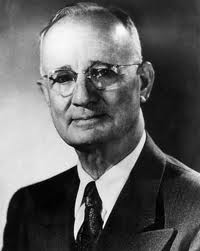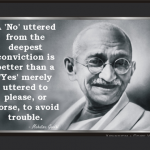If you do what you have always done, you will get what you have always gotten. – Andrew Carnegie
Comfort the afflicted and afflict the comfortable. – Reinhold Niebuhr
 This blog is targeting the dumb things that nonprofit leaders do because we have been taught the wrong things about leadership and have inherited broken and dysfunctional systems.
This blog is targeting the dumb things that nonprofit leaders do because we have been taught the wrong things about leadership and have inherited broken and dysfunctional systems.
According to The Nonprofit Times, more than 45 percent of young nonprofit professionals surveyed recently predicted their next job would not be at a charity. The respondents cited burnout and low pay as the main reasons they would leave. It’s time to change that picture…
This series of posts will attack the traditional thinking and sacred cows and present new paradigms for nonprofit leadership. The way we think of leadership in nonprofit work is wrong and I’m a champion for change. If you are offended by some of my radical ideas, then maybe I can be successful in encouraging you to join my movement to change the level of success for the charity sector.
What is a nonprofit entrepreneur? For that matter, what’s an entrepreneur? And why is it important to nonprofits? An entrepreneur is basically a person who takes on a visionary role to change things and does not want to work within a standard corporate structure. One could characterize an entrepreneur with the following:
- Innovative – Instead of asking “why,” we ask “why not.”
- Disruptive – We don’t accept the status quo.
- Visionary – We see gaps that need to be filled.
- Opportunistic – We see opportunities to fill a need and take action despite the high risk.
- Exploitive – We use the synergies of others for opportunities (in a good sense of the word).
- Leading – The corporate worker manages, the entrepreneur leads.
- Courageous – We are willing to take risks because of the vision.
- Self-reliant – We have a “can-do” attitude.
- Optimistic – We have a “can’t fail” disposition (sometimes a liability).
- Transformational – We embrace change.
- Alchemist – We create formulas for success.
The nonprofit world has become complacent, static, timid, risk-averse, and minimalistic. We have inherited systems that compromise success. We have been taught leadership wrong. We create under-performing cultures (boards, then committees). We don’t understand business principles. And, most of all, we have surrounded ourselves with people who think in the same terms that compromise success. I am looking for other names to describe our work and the organizations we lead. Our thinking is tied to the words we use. We can only reframe our thinking by defining a different paradigm, and replacing the word tied to the old thinking with the new word that does not have the baggage, to free up the different thinking. Here’s what I encourage leaders in this sector to do: ditch the following words which prompt negative scripts in ourselves and others:
- Nonprofit – This is a negative paradigm driver promoting scarcity thinking. We begin thinking in minimalistic terms, which then shapes the thinking of the culture.
- Agenda – This term traps us into thinking about activity rather than thinking in terms of results.
- Volunteer – This word prompts minimalist thinking of doing what’s required, rather than thinking as a servant leadership focusing on achievement.
There will be more on these paradigm shifts in future posts – I invite your dialogue. Expect me to challenge traditional thinking and encourage replacing it with new paradigms. I embrace the thinking of Reinhold Niebuhr, who stated, “comfort the afflicted and afflict the comfortable.” If we choose to agree on everything, then we end creative discourse. If we squelch meaningful conversation around caring points of view, then we may not expose the truth that we seek and we will succumb to the blindness of our own shortsightedness. Heated arguments and blaming in disagreements limits our hearing and thus our understanding.

Napoleon Hill has inspired the legendary leaders in the human development movement by sharing the knowledge he gained from his interviews with the most successful businessmen of the 19th century. His criticism of institutional education was that learning information is not useful. He shared that knowing how to use information leads to success. The men he interviewed achieved great success and wealth without much formal education and brought massive value to humankind. His principles were basically as follows: 1) Have a definite purpose; 2) Keep a positive mental attitude; 3) Bring value to others; and 4) Surround yourself with capable people. Let’s redefine nonprofit as a tax-exempt charity. We are doing social benefit work as social entrepreneurs. I’m using the term “nonprofit” because it has become the identifier for the organizations we lead; whether it’s a church or synagogue, community foundation, association, or educational or government entity, the leadership challenges are similar.
The path ahead:
- Some will catch the vision and move forward in creating a New Architecture of Engagement™.
- Some will seek approval of unnamed others and stall out trying to please everyone, only to frustrate more people.
- Some will ridicule change as unnecessary and time consuming, opting in to the status quo and supporting a downward spiral of inaction.
 Richard Rohr, Daily Meditation, December 30, 2015 One of Jesus’ favorite visual aids is a child. Every time the disciples get into head games, he puts a child in front of them. He says the only people who can recognize and be ready for what he’s talking about are the ones who come with the mind and heart of a child. This is what we call “beginner’s mind.” The older we grow, the more we’ve been betrayed and hurt and disappointed, the more barriers we put up to the primal delight and curiosity of small children. We must never presume that we see. We must always be ready to see anew. But it’s so hard to go back and be able to say, “I don’t know anything.”
Richard Rohr, Daily Meditation, December 30, 2015 One of Jesus’ favorite visual aids is a child. Every time the disciples get into head games, he puts a child in front of them. He says the only people who can recognize and be ready for what he’s talking about are the ones who come with the mind and heart of a child. This is what we call “beginner’s mind.” The older we grow, the more we’ve been betrayed and hurt and disappointed, the more barriers we put up to the primal delight and curiosity of small children. We must never presume that we see. We must always be ready to see anew. But it’s so hard to go back and be able to say, “I don’t know anything.”
Join me for this journey of discovery and dialogue. Please comment as you see fit and share your ideas and concerns.
Upcoming posts:
- The Way We Perceive Nonprofit Leadership is Way Wrong
- Leadership Mental Traps: Buying Into the Crap We Have Been Taught
- Leading Without Dumbing Down: Moving from Scarcity to Abundance
- The Under-Functioning Board is a Result of Bad Leadership
- Leadership Compromises Teams: Learning to Get Out of the Way
- Let’s Hire a Nonprofit Consultant: Hold ON! Do Something Useful
- So, You’re Leading a Nonprofit With No Plan: Think Again!
- The 4 Taboo Words in Nonprofit Leadership: Change Your Language and Up Your Game











